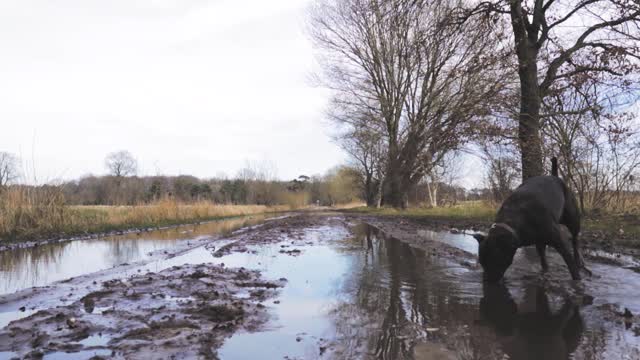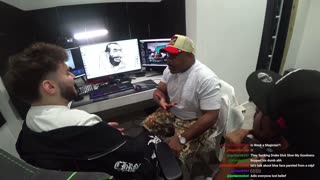Premium Only Content

Destructive Puppy: What to do to reverse the situation.
Destructive Puppy: What to do to reverse the situation.
Living with a dog is a very pleasurable experience, but it can also come with some frustrations. Want an example? Except when the pet is still a puppy, few owners can keep the calm when a destructive dog finishes with a new toy in minutes.
At such times, many of us tend to lose our patience and blame the destructive dog for what happened. But, as with all unwanted behavior, we must evaluate what we are doing (or not doing) to solve the problem.
A frequent complaint among dog owners is that the pet destroys whatever it finds in front of it. As the behavior is usually manifested with more intensity whenever the owners are not at home, many think it is a tantrum or "revenge" of the dog for being left alone, but this is not true.
No doubt, chewing and untangling are natural behaviors for dogs, but they are not the only ones, nor the most important ones. It's just that dogs that live in confined spaces often have little or no stimulation to express these and other natural behaviors.
Thus, they end up directing their energy to the only activity possible in these conditions, which is to gnaw on the objects present in the house. In other words, what for us is interpreted as unwanted destructive behavior is actually an escape valve.
Every dog that has a routine poor in stimuli adequate to the species is a great candidate to present destructive dog behavior and other unwanted reactions, such as excessive vocalizations.
However, besides the quality of life, other factors can influence the dog to like to chew. Therefore, if you want to avoid that the dog destroys mattress or various objects in the environment, it is important to identify these factors.
In general, dogs of breeds originally selected for hunting like to "peel" and destroy objects more than the companion dogs. In this sense, it is worth remembering that some companion dogs are actually great hunters, such as the Yorkshire Terrier and the Dachshund.
Another factor that influences this behavior is the age range of the dog. Curious enough, puppies tend to have a greater need to chew than older dogs. Even because, during the teeth changing phase, which usually occurs after four months, chewing helps to relieve the discomfort in the gums.
The behavior of the destructive dog is usually due to a routine poor in stimuli, serving as an escape valve. Therefore, if your four-legged friend has shown to be a great destroyer, it is not recommended to fight with him, nor keep him away from all the objects that can be chewed.
This is because, by taking this attitude, you remove the only alternative that the dog has, which can promote even more harmful behaviors, such as excessive licking of the paws, which can cause hair loss and injuries in the region.
However, it is recommended to remove dangerous objects for the pet or that have too much value for you until the problem is solved efficiently and properly.
If your dog destroys the bed, it may be a sign of this behavior. Therefore, instead of scolding him, it is interesting to consult a specialist in canine behavior to better understand what the needs of your friend are, adapting the house and his routine to meet them.
In general, one of the main measures adopted to reverse the situation is to enrich the environment with resources, so that the pet has the opportunity to exercise natural behaviors. Acquiring a bed for a destructive dog may be necessary.
Bet on different toys, such as toy feeders, solid balls, teethers, and plush for destructive dogs that emit sounds developed specifically for dogs. In addition, it is essential to take the time to interact with the pet daily, as well as to walk him every day.
It is important to know that the use of toys should not be forced on dogs: they must choose what they want to be entertained with. However, you can direct their use to a certain extent, for example, by not serving them their food in a regular feeder and putting it in a toy feeder before they leave the house.
Far from being something trivial or that the pet does out of a tantrum, the destructive dog's behavior is usually a cry for help, that is, an indication that his routine is inadequate and the animal's quality of life is not good.
Not enough that, the destructive behavior resulting from emotional problems can end up becoming a physical health issue as the destructive dogs are more likely to bite dangerous objects and ingest small parts, which can cause dental fractures and intestinal obstruction.
To ensure safety, teethers should always be larger than the dog's jaw.
-
 LIVE
LIVE
Kim Iversen
51 minutes agoAmerica Under INVASION - Sharia Law Wins In New York City?
10,578 watching -
 LIVE
LIVE
Redacted News
27 minutes agoNick Fuentes & Tucker Carlson DESTROY Ben Shapiro, Cuomo collapses to a socialist | Redacted
2,812 watching -
 LIVE
LIVE
Dr Disrespect
5 hours ago🔴LIVE - DR DISRESPECT - BATTLEFIELD 6 - REDSEC - 10 WINS CHALLENGE
4,986 watching -
 LIVE
LIVE
Akademiks
1 hour agoAdin Ross x 6ix9ine x Akademiks stream
651 watching -
 LIVE
LIVE
StoneMountain64
3 hours agoBattlefield REDSEC HARDCORE, Ultra Movement, and CRAZY Portal Games
83 watching -
 1:09:44
1:09:44
Russell Brand
5 hours agoFrom Curb Your Enthusiasm to Courage — Cheryl Hines on Hollywood, RFK Jr. & Speaking Out - SF646
107K20 -
 1:30:26
1:30:26
The Quartering
3 hours agoWoke Is Back!
101K37 -
 1:18:21
1:18:21
DeVory Darkins
4 hours agoTrump issues CHILLING WARNING to GOP as SCOTUS hears arguments regarding Tariffs
96.5K95 -
 3:35:48
3:35:48
Barry Cunningham
5 hours agoBREAKING NEWS: PRESIDENT TRUMP SPEECH AT THE MIAMI BUSINESS FORUM! (MIKE JOHNSON PRESSER)
77.3K12 -
 2:04:47
2:04:47
The Charlie Kirk Show
5 hours agoOnward | Henderson, Laurie, Miles | 11.5.2025
92.9K26